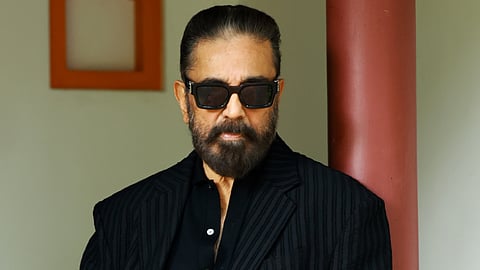

Hype has a ripple effect, which transcends time, sometimes decades. When the memories of a seismic impact left by Nayakan (1987) were invoked, with the reunion of Kamal Haasan and Mani Ratnam after almost forty years for Thug Life, expectations were understandably high. What registers as excitement for the audience translates as a challenge for Kamal Haasan. “With this film, we want to make sure you forget Nayakan,” declares the actor, revealing the shared ambitions with his director Mani Ratnam. With what seems like a Shakespearean gangster drama structured around organised crime, themes of succession, betrayal, and the unmissable connection to the names of the protagonists—Velu Naicker in Nayakan and Rangaraaya Sakthivel Naicker in Thug Life—speculations of a narrative connection between the two films were inevitable. Kamal deftly quells the rumours by rephrasing his earlier comment. “If we wanted to continue that story, we would have let you know.”
A common aspect of both Kamal Haasan and Mani Ratnam happens to be their astounding ability to evolve and remain relevant over the years. Kamal comments on the difference between the actor-director duo that made Nayakan and Thug Life. “He is not the same Mani Ratnam, and I’m not the same Kamal Haasan anymore. I’m an experienced actor now. Even AR Rahman is not the same person who made Roja (1992). We have all evolved over the years. It would be wrong if we remained the same. I look upon our evolution as a matter of pride. I’m glad we are not the same people anymore,” says Kamal.
The actor recounts his conversations with the director. “He is doing the kind of work he spoke about during our conversations forty years ago. So, he is moving in the right direction and I’m happy about that,” he says. According to the actor, while discussing several stories, Mani Ratnam was particularly curious about one of Kamal’s scripts titled Amar Hai. However, the actor reveals how a lot has changed during the script’s ultimate transformation to Thug Life. Kamal says, “If I release the script of Amar Hai after Thug Life is out, you wouldn’t be able to fathom how this became that. And I’m happy about that. This is a true collaboration, and it is what I like about working with Mani Ratnam.” With around sixty-five years of film career, Kamal shares screen space with a new generation of actors, like Ashok Selvan and Silambarasan TR, in the upcoming film. “The working relationship with the young actors was brilliantly orchestrated by Mani Ratnam. Even if the actors didn’t understand his directions at times, they still exhibited unquestioning loyalty. They have a lot of respect for him,” he says.
Last year, at the age of 69, Kamal Haasan flew to the USA to attend classes on Artificial Intelligence. “Artificial Intelligence is a broad field, and in terms of cinema, it is still at a very nascent stage. I felt like I needed to learn about it, but didn’t know what to learn, ” says Kamal, who believes we shouldn’t have fears about AI replacing humans. “It is like any other technology,” he says. “We should use it like how we use computers. AI will be a part of our everyday lives.” As someone who was a part of Tamil cinema for years, and as an observer of the unceasing waves of time, Kamal takes an example from the evolution of Tamil cinema to point to the one thing that rides the waves of time unchanged. “Throughout the years, everything around me changed, the lights, the camera, and the car outside the film set, but we remain the same. Humans are fundamentally the same,” he notes poignantly.
As an actor noted for experimentation and versatility, Kamal’s recent big hit, Vikram (2022), and his much-awaited Thug Life, both happen to be action-packed gangster dramas. Kamal’s unceasing desire for variety, however, remains intact. “I still have the thirst to be a part of different types of films. Unfortunately, since the gap between films has stretched in recent times, it has become difficult for me to try a variety of genres,” says Kamal. The actor fondly looks back at the times when he went on a spree of low-budget films. “16 Vayathinile (1977) was made around the time MGR and Sivaji were active. We struggled to sell that film. Even though I used to do a lot of films back then, I had a special place in my heart for films like 16 Vayathinile. So, I used to carry its music album wherever I went and showed it to everyone. People didn’t understand why I wanted to be a part of such films, but I had the conviction to take it to everyone.” He then hammers home his point, “There should be big budget and small budget films as well. We need to have a variety of films.”
On the need for different types of films, Kamal takes the conversation from 16 Vayathinile to the rise and fall of trends in Hollywood. “After the end of World War II, perhaps to forget the effects of war, they used to make back-to-back musicals in the West. People eventually got tired of that, and things were changed by a group of filmmakers. The final nail in the coffin was the arrival of auteurs like Francis Ford Coppola, George Lucas, and Martin Scorsese — the ‘New York gang’. A lot of us were inspired by their works," says Kamal, who also touched upon his impact on the movers and shakers of the film industry. “My body of work is my investment for the future. Now let’s see what the next generation chooses to earn with it,” says a hopeful Kamal.